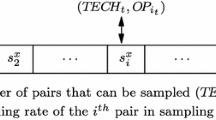Abstract
This paper considers an interesting topic of recipe qualification during each fabrication step of semiconductor manufacturing. In particular, this type of stochastic optimization scheme within a discrete-event simulation process is discussed and a new optimization method, with the capability to anchor robust recipes for batch processing, is proposed, implemented and evaluated. A particular real-coded genetic algorithm (GA) suitable for resolving continuous optimization problems in noisy environments is developed. Four test functions appearing in the literature are used as a test-bed to assess the proposed genetic algorithm via a variety of experimental studies, showing that the new method can produce much more accurate estimates of the true optimum points than the other two optimization procedures, the Nelder-Mead (NM) simplex search procedure and a well-known variant (RS+S9) of Nelder-Mead suitable for stochastic optimization. As such, the new method could serve as a useful tool for process recipe optimization in noisy semiconductor manufacturing environments. Finally, the chemical mechanical planarization (CMP) process, a turnkey process during semiconductor fabrication, is simulated from batch to batch based on the real-data equipment model and the presented algorithm is employed to seek the optimal recipe profile while processing each batch of wafers sequentially through the CMP tool.
Similar content being viewed by others
References
Goldberg DE, Rudnick MW (1991) Genetic algorithms and the variance of fitness, Complex Systems, 5(3), pp. 265-278
Miller BL (1997) Noise, sampling and efficient genetic algorithms, Ph.D. thesis, University of Illinois at Urbana-Champaign, Urbana
Rattray LM, Shapiro J (1997) Noisy fitness evaluation in genetic algorithms and the dynamics of learning, in: Belew RK, Vose MD (Eds.), Foundations of Genetic Algorithms 4, Morgan Kaufmann, San Mateo, CA
Stroud PD (2001) Kalman-extended genetic algorithm for search in nonstationary environments with noisy fitness evaluations, IEEE Trans Evolutionary Comput, 5(1):66-77
Nelder JA, Mead R (1965) A simplex method for function minimization, Comput J, 7:308-313
Barton RR, Ivey JS, Jr. (1996) Nelder-Mead simplex modifications for simulation optimization, Manage Sci 42:954-973
Holland J (1975) Adaptation in Natural and Artificial Systems, The University of Michigan Press, Ann Arbor, MI
Goldberg DE (1998) Genetic Algorithms in Search, Optimization and Machine learning, Addison-Wesley, New York
Zahara E, Fan SK, Real-Coded Genetic Algorithm in Noisy Environments, Technical Report, Department of Industrial Engineering and Management, Yuan Ze University, Taoyuan, Taiwan 320.
Brooks SH (1959) A comparison of maximum-seeking methods, Oper Res 7:430-457
Dennis JE, Jr., Woods DJ (1987) Optimization on microcomputers: the Nelder-Mead simplex algorithm, in New Computing Environments: Microcomputers in Large Scale Computing, Wouk , A.(ED.), SIAM, Philadelphia, PA, pp. 116-122
Rees LP, Clayton ER, Taylor B W, III (1985) Solving multiple response simulation models using modified response surface methodology within a lexicographic goal programming framework, IIE Trans 17:47-57
Humphrey DG, Wilson JR (2000) A revised simplex search procedure for stochastic simulation response surface optimization, INFORMS J Comput 12:272-283
Shapiro SS, Wilk MB (1965) An analysis of variance test for normality, Biometrika 52:591-611
Del Castillo E, Yeh J (1998) An adaptive run-to-run optimization controller for linear and nonlinear semiconductor processes. IEEE Trans Semiconductor Manuf 11:285-295
Fan SK (2000) Quality improvement of chemical-mechanical wafer planarization process in semiconductor manufacturing using a combined generalized linear modeling-non-linear programming approach. Int J Prod Res 38:3011-3029
Author information
Authors and Affiliations
Corresponding author
Rights and permissions
About this article
Cite this article
Zahara, E., Fan, SK. Real-coded genetic algorithm for stochastic optimization: A tool for recipe qualification of semiconductor manufacturing under noisy environments. Int J Adv Manuf Technol 25, 361–369 (2005). https://doi.org/10.1007/s00170-003-1935-0
Received:
Accepted:
Published:
Issue Date:
DOI: https://doi.org/10.1007/s00170-003-1935-0




